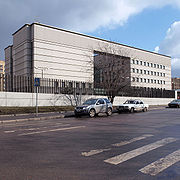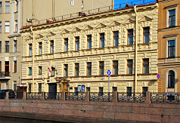
Japanese-Russian relations
Encyclopedia


Japanese-Soviet relations
Relations between the Soviet Union and Japan between the former's establishment in 1922 and its collapse in 1991 tended to be hostile. Japan had sent troops to counter the Bolshevik presence in Russia's Far East during the Russian Civil War, and both countries had been in opposite camps during...
. Relations between the two nations are hindered primarily by a dispute over the Kuril Islands
Kuril Islands dispute
The Kuril Islands dispute , also known as the , is a dispute between Japan and Russia over sovereignty over the South Kuril Islands. The disputed islands, which were occupied by Soviet forces during the Manchurian Strategic Offensive Operation at the end of World War II, are under Russian...
, a dispute that is long-running, but rarely gets serious enough to concern other nations. On February 10, 1904, a conflict between Imperial Japan and the Russian Empire
Russian Empire
The Russian Empire was a state that existed from 1721 until the Russian Revolution of 1917. It was the successor to the Tsardom of Russia and the predecessor of the Soviet Union...
resulted in the Russo-Japanese war
Russo-Japanese War
The Russo-Japanese War was "the first great war of the 20th century." It grew out of rival imperial ambitions of the Russian Empire and Japanese Empire over Manchuria and Korea...
over Manchuria
Manchuria
Manchuria is a historical name given to a large geographic region in northeast Asia. Depending on the definition of its extent, Manchuria usually falls entirely within the People's Republic of China, or is sometimes divided between China and Russia. The region is commonly referred to as Northeast...
and Korea
Korea
Korea ) is an East Asian geographic region that is currently divided into two separate sovereign states — North Korea and South Korea. Located on the Korean Peninsula, Korea is bordered by the People's Republic of China to the northwest, Russia to the northeast, and is separated from Japan to the...
. This, and several smaller conflicts, prevented both countries from signing a peace treaty after World War II
World War II
World War II, or the Second World War , was a global conflict lasting from 1939 to 1945, involving most of the world's nations—including all of the great powers—eventually forming two opposing military alliances: the Allies and the Axis...
. As of 2011 matters remain unresolved.
The government of Boris Yeltsin took power in Russia in late 1991 upon the dissolution of the Soviet Union
Dissolution of the Soviet Union
The dissolution of the Soviet Union was the disintegration of the federal political structures and central government of the Union of Soviet Socialist Republics , resulting in the independence of all fifteen republics of the Soviet Union between March 11, 1990 and December 25, 1991...
. Once again, Moscow took a stand in opposition to returning the disputed territories to Japan. Although Japan joined with the Group of Seven industrialized nations in contributing some technical and financial assistance to Russia, relations between Tokyo
Tokyo
, ; officially , is one of the 47 prefectures of Japan. Tokyo is the capital of Japan, the center of the Greater Tokyo Area, and the largest metropolitan area of Japan. It is the seat of the Japanese government and the Imperial Palace, and the home of the Japanese Imperial Family...
and Moscow
Moscow
Moscow is the capital, the most populous city, and the most populous federal subject of Russia. The city is a major political, economic, cultural, scientific, religious, financial, educational, and transportation centre of Russia and the continent...
remained poor. In September 1992, Russian president Boris Yeltsin postponed a scheduled visit to Japan. The visit took place on October 11, 1993. He made no further concessions on the Kuril Islands dispute over the four Kuril Islands (northeast of Hokkaido), a considerable obstacle to Japanese-Russian relations, but did agree to abide by the 1956 Soviet pledge to return two areas (Shikotan
Shikotan
Shikotan, in Russian , Japanese , or シコタㇴ), is one of the bigger islands of the Kuril Islands, which are controlled by Russia. It is one of the four southernmost islands which Japan maintains a claim for...
and the Habomai Islands) to Japan. Yeltsin also apologized repeatedly for Soviet mistreatment of Japanese prisoners of war after World War II. In March 1994, then Japanese minister of foreign affairs Hata Tsutomu visited Moscow and met with Russian minister of foreign affairs Andrei Kozyrev and other senior officials. The two sides agreed to seek a resolution over the persistent Kuril Islands dispute, but the decision of the dispute is not expected in the near future. Despite the territorial dispute, Hata offered some financial support to Russian market-oriented economic reforms. On July 30, 1998, the newly elected Japanese prime minister Keizō Obuchi
Keizo Obuchi
was a Japanese politician who served in the House of Representatives for twelve terms, and ultimately as the 84th Prime Minister of Japan from July 30, 1998 to April 5, 2000. His political career ended when he suffered a serious and ultimately fatal stroke....
had focused on major issues: signing a peace treaty with Russia, and renewing the Japanese economy. Unfortunately before his death, his policy with the Russian Federation has avoided implementation and the relations between the two nations remained under a state of war.
On August 16, 2006, Russian maritime authorities killed a Japanese fisherman and captured a crab fishing boat in the waters around the disputed Kuril Islands. The Russian foreign ministry has claimed that the death was caused by a "stray bullet".
On 28 September 2006, Russian Foreign Minister Sergei Lavrov said Russia would "continue the dialogue with the new Japanese government. We will build our relations, how the peoples of the two countries want them to be. Foreign Minister
Minister for Foreign Affairs (Japan)
The of Japan is the Cabinet member responsible for Japanese foreign policy and the chief executive of the Ministry of Foreign Affairs.Since the end of the American occupation of Japan, the position has been one of the most powerful in the Cabinet, as Japan's economic interests have long relied on...
Taro Aso
Taro Aso
was the 92nd Prime Minister of Japan serving from September 2008 to September 2009, and was defeated in the August 2009 election.He has served in the House of Representatives since 1979. He was Minister for Foreign Affairs from 2005 to 2007, and was Secretary-General of the LDP briefly in 2007 and...
remained on his post in the government. We have good, long-standing relations, we will act under the elaborated program."
The dispute over the Southern Kuril Islands
Kuril Islands dispute
The Kuril Islands dispute , also known as the , is a dispute between Japan and Russia over sovereignty over the South Kuril Islands. The disputed islands, which were occupied by Soviet forces during the Manchurian Strategic Offensive Operation at the end of World War II, are under Russian...
deteriorated Russo-Japan relations when the Japanese government published a new guideline for school textbooks on July 16, 2008 to teach Japanese children that their country has sovereignty over the Kuril Islands. The Russian public was generally outraged by the action and demanded the government to counteract. The Foreign Minister of Russia announced on July 18, 2008 "[these actions] contribute neither to the development of positive cooperation between the two countries, nor to the settlement of the dispute." and reaffirmed its sovereignty over the islands.
On January 30, 2010, Russian border guards engaged in a dispute with two Japanese fishing boats.
After the election of the new Japanese Prime Minister, Naoto Kan
Naoto Kan
is a Japanese politician, and former Prime Minister of Japan. In June 2010, then-Finance Minister Kan was elected as the leader of the Democratic Party of Japan and designated Prime Minister by the Diet to succeed Yukio Hatoyama. On 26 August 2011, Kan announced his resignation...
, a statement was done by him that he would energetically address Japan’s ties with Russia and would "push the wheels of the cart forward", both in the field of politics and economics, which would eventually lead to a peace treaty after the many years of the Kuril Islands Dispute. Medvedev visited Kunashir Island on November 1 where he described the Kuril islands as "a very important region in our country," and angered Japan, whose Prime Minister Naoto Kan called his visit "regrettable".
Following the heating up of the dispute in early 2011, President Dmitry Medvedev ordered significant reinforcements to the Russian defences on the Kuril Islands
Defence of the Kuril Islands
Defence of the Kuril Islands is for the most part the responsibility of the Russian 18th Artillery Division, which is stationed on the islands. Substantial improvements of the Kuril defences were announced by President of Russia Dmitry Medvedev in February 2011 as a deterrent against Japanese action...
in February 2011.
See also
- Relations between the Empire of Japan and the Russian EmpireRelations between the Empire of Japan and the Russian EmpireThe Relations between the Empire of Japan and the Russian Empire were mostly hostile due to the conflicting territorial expansions of both empires. Diplomatic and commercial relations between the two empires were established from 1855 onwards...
(1867–1922) - Japanese-Soviet relationsJapanese-Soviet relationsRelations between the Soviet Union and Japan between the former's establishment in 1922 and its collapse in 1991 tended to be hostile. Japan had sent troops to counter the Bolshevik presence in Russia's Far East during the Russian Civil War, and both countries had been in opposite camps during...
(1922–1991) - Foreign relations of JapanForeign relations of JapanForeign relations of Japan is handled by the Ministry of Foreign Affairs of Japan.Since the surrender after World War II and the Treaty of San Francisco, Japanese diplomatic policy has been based on close partnership with the United States and the emphasis on the international cooperation such as...
- Foreign relations of RussiaForeign relations of RussiaThe foreign relations of Russia is the policy of the Russian government by which it guides the interactions with other nations, their citizens and foreign organizations and sets standards of interaction for Russian organizations, corporations and individual citizens towards them...
- Russians in JapanRussians in JapanThe first recorded landing of Russians in Japan was in 1739 in Kamogawa, Chiba during the times of Japanese seclusion of the Edo period, not counting landings in Hokkaidō, which was not under Japanese administration at these times.- Russian missions :...
- Japanese people in RussiaJapanese people in RussiaJapanese people in Russia form a small part of the worldwide community of Nikkeijin. They count various notable political figures among their number.-Early settlement:...
- Russo-Japanese warRusso-Japanese WarThe Russo-Japanese War was "the first great war of the 20th century." It grew out of rival imperial ambitions of the Russian Empire and Japanese Empire over Manchuria and Korea...
External links
- Embassy of Japan in Moscow
- Consulate-General of Japan in Khabarovsk
- Consulate-General of Japan in Saint Petersburg
- Consulate-General of Japan in Vladivostok
- Consulate-General of Japan in Yuzhno-Sakhalinsk
- Embassy of the Russian Federation in Tokyo
- Consulate-General of the Russian Federation in Sapporo

